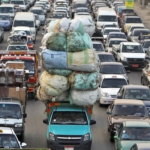News & Events
The Repercussions of Overloading on Roads and Drivers
Overloaded vehicles, particularly freight vehicles, are practically destroying our roads, and thus our economic growth, since one of the prerequisites of economic growth is adequate transport infrastructure. Road damage caused by overloading requires high maintenance and repair costs, which constitute, eventually, a burden both to the state and to taxpayers.
Overloading is a dangerous risk that can lead to unnecessary and avoidable road deaths, in addition to causing the rapid deterioration of our road networks.
Overloading and Road Safety
– Overloaded vehicles are less stable and harder to control, and they require longer periods of time and longer distances to stop.
– The tires of overloaded vehicles overheat much faster than those of normal vehicles, and this can lead to dangerous and life-threatening blow-outs.
– Overloaded vehicles accelerate much slower than normal vehicles, and therefore pose a threat to drivers since it is difficult for them to overtake other vehicles.
– The brakes on overloaded vehicles are pushed to their limits, and can quickly overheat and lose their effectiveness, which can be very dangerous at high speeds.
– Seat belts cannot be used properly in overloaded vehicles.
– Frequently overloaded vehicles require higher maintenance costs since they will need to be repaired more frequently.
– Insurance policies might not cover overloaded vehicles, since overloading is illegal.

